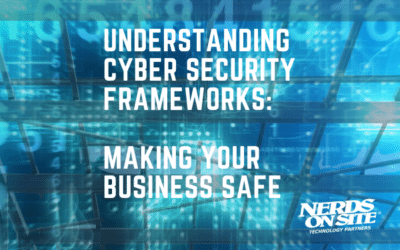Can we train enough good guys to stop the bad guys?
Billionaire financier Warren Buffett sees cyber attacks as a more significant threat to humanity than nuclear weapons. He views them as “the number one problem with mankind.” Holy cow! Many would agree with him as we watch, with heightened security awareness, cybercrime incidents continue to rise. One of the reasons for this is the lack of IT professionals qualified to defend us against malicious cybercriminals. It seems not enough people are interested in a cybersecurity job. And we need them: information security analysts, the security engineer, information security auditors, incident responders. The list goes on, and we need all of them. According to Cyber Seek, there are about 465,000 open positions in cybersecurity nationwide as of May 2021 — a tech job-tracking database from the U.S. Commerce Department — and the trade group CompTIA. And according to the New York Times, this number hits 3.5 million globally. There is a need for more qualified cybersecurity professionals. So, where do we get them? First, we have to train them.
Article Contents
Back up. What is Cybersecurity?
Cybersecurity is an exciting, possibly lucrative, and in-demand field concerned with protecting valuable and sensitive information from cyberattacks by hackers and other malicious actors.
What is the education required to become a cyber security specialist?
Are cyber careers hard to get into?
There is a misconception about Cybersecurity being too technical and challenging, only accessible by extraordinarily gifted individuals with a talent for intense coding or computer programming. While this is not true, certain traits beyond security awareness and curiosity will make getting a cyber security education easier, whether by a certificate program, undergraduate students’ degrees, online degrees, or graduate school.
- Critical and Analytical Skills: Cybersecurity involves efficient and quick problem solving and will often require you to think quickly on your feet.
- Tech Knowledge and Constant Learning: Security and s security training are continually evolving. You must always stay updated about the latest changes in Cybersecurity for the good of your professional development.
- Communication Skills: Cybersecurity is not usually a one-person job and requires constant communication with various partners and clients to ensure dependable services.
- Dedication: Lastly, Cybersecurity is a relatively fast-paced and continuously developing field. It requires a lot of dedication and hard work to establish yourself as a professional with integrity and expertise.
Higher Education – Degrees and Certifications.
Degrees
Cyber security bachelor’s degrees look at cybercrime from all sides. How breaches happen, and ways to keep data safe, secure, and private through proper network security. This security training aims to equip students with the skill set to defend a company’s computer operating systems, networks, and data from cyber-attacks. While part of the learning is a theory, cyber security degrees are hands-on, technical degrees.
Different Types of Cyber Security Bachelor’s Degree.
There’s more than one type of Cyber Security Bachelor’s Degree. Some may be more technical, while others relate more to the IT industry’s business side of network security. Here are four examples as described by cyber-security.degree/online: Bachelors in Cyber Security (BS) Schools may offer programs in a variety of ways. Some may provide a general cyber security core covering courses like cyber principals and database design. Then, it may allow the student to choose a track. You may select a broad way that covers both offense and defense concepts. Another option may be an offense track that focuses more on hacking. There may also be a defense track covering cloud security and digital forensics. Business Admin (BBA) – Cyber Security At the core of this degree are typically basic business concepts meant to help you hone your skills as a leader. Along with business classes, you may take a handful of courses in cyber security. Classes could include how to manage systems and databases. And how to keep them safe and secure. This may also expose you to trends in software. Information Systems (BS) – Cyber Security Intelligence In this program, you often study network systems. You are also likely to learn about cyber defense. This could mean learning how to craft a tactical plan. Then share it with execs in your company. Often, this takes a deep grasp of national security issues. So, you may also study foreign policy and data privacy laws. Criminal Justice (BS) – Crime Analysis Criminal justice often studies laws and how to solve cybercrime. To do this, you may study cyber laws. Plus the ins and outs of ethical hacking.
Master’s Degree in Cyber Security
A master’s in cybersecurity can equip graduates to serve as leaders, researchers, and analysts in the growing information security field. Cybersecurity master’s degrees usually include cryptography, digital forensics, and ethical hacking courses. Students can also pursue specializations such as analysis, systems, or network security. Earning a cybersecurity master’s degree usually takes about two years.
Professional Certifications
While most cybersecurity professionals have at least a bachelor’s degree in computer science, many companies prefer candidates who have a certification to validate knowledge of best practices. Hundreds of certifications are available, from general to vendor-specific, entry-level to advanced. Here’s a look at the top 5 entry-level certifications as determined by coursera.org:
- CompTIA A+
CompTIA A+ is widely considered the go-to certificate for a well-rounded entry-level introduction to IT. Those who pass the certification exams will be qualified to solve fundamental networking, operating systems, security, and mobile devices problems. The CompTIA A+ certification requires two exams. The CompTIA A+ provides a general introduction to the IT world. From there, many IT professionals can specialize in a specific field of IT, like networks, security, or cloud computing, either by building experience or gaining relevant certifications.
- Cisco Certified Network Associate (CCNA)
The CCNA certification is an associate-level certification covering the fundamentals of IT networking issues. This includes network access, IP connectivity, and IP services. Though it’s not a vendor-neutral certification—meaning it’ll test you exclusively on Cisco products and tools—it’s popular among network professionals because of Cisco’s dominance in the networking market. One exam is required to get the CCNA certification.
- CompTIA Security+
The CompTIA Security+ certification will equip you to perform basic security functions. The certification will cover encryption, physical security, and wireless security subjects. It requires one exam. Suppose you’re interested in becoming an IT security specialist. In that case, you can take more advanced security certifications like the Certified Information Systems Auditor (CISA) or the advanced Certified Information Systems Security Professional (CISSP).
- Microsoft Fundamentals
The Microsoft fundamentals certifications test core technology skills, making them good entry-level qualifications for those expected to work with Microsoft products. Knowing your way around Microsoft products is likely to be an in-demand skill—over half of surveyed IT decision-makers worldwide said their companies would invest in Microsoft technology, Global Knowledge reports. The Fundamentals certifications replaced the Microsoft Technology Associate (MTA) certifications, which were retired on June 30, 2021.
- Amazon Web Services (AWS) Cloud Practitioner
Cloud computing, along with security, is one of the most in-demand fields in IT, and Amazon Web Services (AWS) is currently the most-used cloud platform in the world. So learning the AWS platform may give you an edge in this growing industry. The AWS Cloud Practitioner certification is the most entry-level of the AWS certifications.
- Requirements: There are no prerequisites to the exam, but Amazon recommends having at least a basic understanding of AWS services and uses and around six months of exposure to AWS.
- Certification path: After the AWS Cloud Practitioner, you can get a more advanced certification like the AWS Certified Developer or AWS Certified Solutions Architect.
Read more: 5 Cloud Certifications to Start Your Cloud Career.
How much does a cybersecurity education cost?
The cost of a cybersecurity degree varies by school. Still, the National Center for Education Statistics reports that public, four-year universities charged their in-state students an average of $9,349 in tuition and fees as of the 2019-20 academic year.
Is there financial aid to help me study cybersecurity?
There are many scholarships to study cyber security. They vary widely in value and in who qualifies. Aerial Liddle of cybersecurityguide.org has saved you a lot of googling time by putting together a very detailed list of what is available. With such a desperate need for cybersecurity professionals, you can bet there is lots of help to help people qualify as information security experts.
How long is schooling for cyber security?
It may take four years of full-time study to earn a BS in cyber security. And while many plans entail 120 credits, you may fast-track your studies. There may be a few ways to do this. One may be to transfer credits from an associate degree. Another way could be to earn your degree online. Then, take a full course load and no summer break.
What are the different types of cyber security jobs?
There is a myriad of different jobs in the cyber security arena. While they all have other responsibilities, they have the same goal: to protect online data from being compromised. Here’s a shortlist of job titles and brief descriptions. For a more exhaustive list, visit our friends at cybersecurityeducation.org.
- Security Specialist – entry-level role with huge potential
- Security Administrator – keep security running smoothly every day
- Vulnerability Assessor – spot system vulnerabilities and create solutions
- Cryptographer – write the code hackers can’t crack
- Chief Information Security Officer – expertise in security combined with business acumen.
How easy is it for Bachelor’s Degree in Cybersecurity Graduates to get hired?
Although most technology graduates are sought after these days, with an estimated 3.5 million unfilled cyber security jobs worldwide, cyber security professionals are in exceptionally high demand. Governments around the globe are hiring cyber security professionals. The private sector also employs professionals with the requisite knowledge and skills to help avoid growing cyber security threats.
How much can I expect to get paid?
Talent.com reports that the average salary for cybersecurity jobs in the USA is $116,734 per year or $59.86 per hour. Entry-level positions start at $87,728 per year, while most experienced workers earn $162,561 per year.
What skills are essential in a Cyber security specialist?
Each specialty is going to require its own set of technical skills. But it is often skills that set the star employees apart from the rest, like solid work habits and soft skills.
Solid Work Habits
To get ahead, you’re going to want to display:
- Eagerness to dig into technical questions and examine them from all sides.
- High level of security awareness
- Enthusiasm and a high degree of adaptability.
- Strong analytical and diagnostic skills.
- A current understanding of common web vulnerabilities.
- Maintaining awareness and knowledge of contemporary standards, practices, procedures, and methods.
Soft Skills
These can often be the most difficult to develop, but they are necessary:
- Excellent presentation and communications skills to effectively communicate with management and customers.
- Ability to articulate complex concepts (both written and verbally).
- Ability, understanding, and usage of active listening skills (especially with customers!).
Why is it difficult to find trained cyber security specialists?
The problem is that college students majoring in computer science don’t always select cybersecurity jobs. After graduation, most tech students will look at their career options and pick jobs in software development, artificial intelligence, robotics, data science, or web development. Only a tiny percentage embark on cybersecurity careers as information security professionals.
The long and the short of it
The world needs more qualified cybersecurity experts in the information technology field. Getting the proper education and training to take this career route is not necessarily complex. But it does take focus and commitment. Take time to consider whether this is the type of career you would be interested in. The world needs you.












